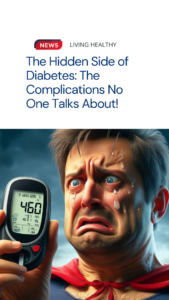Receiving a diabetes diagnosis can be one of the most transformative moments in a person’s life. The news often comes without warning, triggering a flood of emotions ranging from shock and denial to acceptance and adaptation. In this article, we will explore the common emotional stages that occur after a diabetes diagnosis, illustrating each one with real-life testimonials from those who live with this reality every day.
Contents
- 1 1. Diabetes Diagnosis - Shock and Denial: "This can't be happening to me"
- 2 2. diabetes-diagnosisAnger and Frustration After the diabetes diagnosis: "Why did this happen to me?"
- 3 3. Fear and Uncertainty: "How will I live from now on?"
- 4 4. Common Sadness and Depression After Diabetes Diagnosis: "I’ll Never Be the Same Again"
- 5 5. Diabetes Diagnosis - Acceptance and Adaptation: "I can live well with diabetes"
1. Diabetes Diagnosis - Shock and Denial: "This can't be happening to me"
For many people, the discovery of diabetes happens unexpectedly, often during a routine check-up or after experiencing symptoms that didn’t seem serious. The first emotion that arises is shock.
A Reddit user shared:
“When my doctor told me my A1C was 8.2 and that I had type 2 diabetes, my heart sank. My grandfather died from diabetes complications, and now I was stuck on the same path? I refused to believe what I was hearing.” (Source)
This type of reaction is common, as the diagnosis can feel like a blow to one’s identity. During this phase, there is a strong tendency to deny the severity of the situation. Another testimonial reinforces this experience:
“I thought: maybe it was a lab error, maybe I’m just going through a rough patch.“
This stage can last days, weeks, or even months, especially for those who don’t show visible symptoms. Many try to avoid reality by continuing with the same eating habits or ignoring medical advice.
2. diabetes-diagnosisAnger and Frustration After the diabetes diagnosis: "Why did this happen to me?"
As reality begins to set in, the next predominant emotion is anger. The diagnosis can feel unfair, leading the person to search for someone to blame or to feel resentment toward their new condition.
A Reddit user expressed their frustration:
“I feel like I’ve been punished for something I didn’t even know I was doing wrong. I always tried to eat well, and now I have to deal with this?” (Source)
This anger can be directed at their own body, doctors, or even loved ones. Another testimonial reflects this anger:
“My friends eat whatever they want, drink soda, live on fast food, and they’re fine. I eat a plate of rice, and I’m doomed?”
Anger can also manifest as regret. Many diagnosed individuals feel they could have avoided the disease if they had made different choices.
3. Fear and Uncertainty: "How will I live from now on?"
After the anger phase, fear and anxiety take over. The lack of knowledge about the disease, the necessary adjustments to diet, and the risk of future complications create significant uncertainty.
A heartfelt Reddit testimonial demonstrates this anguish:
“I stayed up at night reading about amputations, kidney failure, and heart problems. I felt like my life was over at that moment.”
Another user expressed similar fears:
“How will I go out to eat with my friends? How will I travel? How will I live without the pleasure of eating what I love?”
This fear can be paralyzing and is one of the greatest emotional challenges for those newly diagnosed. Support from healthcare professionals and support groups is essential during this time
4. Common Sadness and Depression After Diabetes Diagnosis: "I’ll Never Be the Same Again"
The realization that diabetes has no cure and that it will require lifelong management can lead to deep sadness and even depression.
One user opened up:
“I felt like a failure. Like my body had betrayed me. I cried for nights on end, feeling like I’d never have a normal life again.”
Another testimonial reinforces this feeling:
“Food was always one of the greatest joys in my life. Now, everything feels restricted, and I feel empty.”
Many patients begin to avoid social gatherings, dinners with friends, or family events because they feel they can no longer enjoy the same moments as before.
5. Diabetes Diagnosis - Acceptance and Adaptation: "I can live well with diabetes"
Over time, many individuals begin to understand that diabetes is not the end of the road. Gradually, they learn to adapt their habits, explore new possibilities, and even find a new purpose in life.
A user who has lived with diabetes for years shared:
“At first, I only saw restrictions. But little by little, I realized that my new diet made me healthier. I started feeling better and more energetic. Now, looking back, I see that this diagnosis saved me.”
Another testimonial inspires hope:
“I thought my life was over, but now I see that’s not the case. I can control diabetes instead of letting it control me.”
Examples like Carmen, who has lived with diabetes for over 73 years, show that it’s possible to lead a fulfilling life even with the disease. Acceptance doesn’t mean resignation but rather adaptation to a new reality.
In addition to this story, there are other inspiring tips from people who live with diabetes:
Patricia Bittencourt discovered her condition 10 years into her life and, at 48, inspires other people with her life story.
FLEURY
Marlene Salete Batiston Corrêa, Bianca’s mother, shared the experience of lidar as the diagnosis of type 1 diabetes in her family at the age of 8, highlighting the importance of family support and education about work.
DIABETICSAUDAVEL.COM.BR
Carmen, diagnosed in 1950, has been living with diabetes for more than 73 years and has shared her journey of improvement and adaptation over decades.
UOL.COM.BR
These stories show that, despite two challenges, it is possible to live well with diabetes or to adopt a healthy lifestyle and seek appropriate support. It is obvious that it will be necessary to make a change in lifestyle, but it is possible to achieve remission of diabetes and live a life very close to normality.






